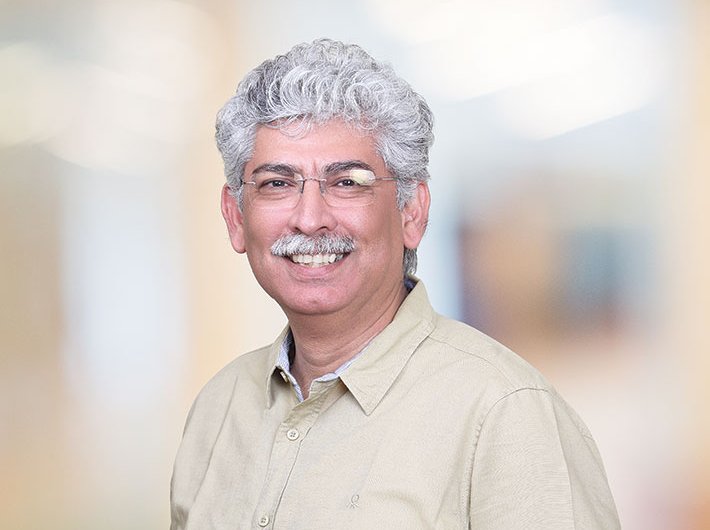Dr Pawan Bakhshi, of the Bill & Melinda Gates Foundation, talks about its India specific programmes which aim to broaden the reach of low-cost digital financial services for the poor.
Financial inclusion can fuel the economic growth of a country. In conversation with Rahul Trivedi, Dr Pawan Bakhshi, of the Bill & Melinda Gates Foundation, talks about its India specific programmes which aim to broaden the reach of low-cost digital financial services for the poor. Edited excerpts:
What is your idea of financial inclusion? What challenges does India face in attaining financial inclusion?
In just past seven years, 700 million people worldwide have gained access to banks and mobile-money accounts. This revolution in financial inclusion has the potential to offer a pathway out of poverty for millions of people and to spur broad economic growth. The Digital Financial Services (DFS) model is simultaneously a powerful anti-poverty strategy and an extraordinary catalyst of sustainable economic development for entire national and regional economies.
According to the McKinsey Global Institute, digital financial services could be catalytic for people and economies making it possible for approximately 1.6 billion people to enter the formal economy for the first time. The same study estimates that DFS could add $3.7 trillion to the annual GDP of emerging markets by 2025.
Data and findings from the World Bank Findex report (2017) are encouraging. Progress has been significant. India has seen strong growth in account ownership, including among women and poor people. Building on this basic foundation of providing a bank account to its entire people, India has huge potential to further improve the account usage.
However, while digital technology and changes in national policy are clearing away obstacles that once kept these services out of reach for many, tough challenges remain. Policymakers and business leaders must invest in innovative technologies, new regulatory standards, and infrastructure to ensure continued progress toward the promise of financial inclusion.
Tell us about Financial Services for the Poor programme. What is the strategy for India regarding FSP?
We believe that providing poor people with reliable access to a range of safe, affordable financial tools and services can be one of the most powerful ways to help them build better, healthier lives. The foundation’s Financial Services for the Poor programme works to broaden the reach of low-cost digital financial services for the poor.
Our strategy is aimed at supporting what we believe are the most catalytic approaches to financial inclusion, helping to drive the development of digital payment systems that can spread the use of digital financial services quickly.
We support efforts by the Indian government to digitise government payments to poor households and encourage new digital banking models. We also work to identify gaps in digital financial inclusion efforts, and we work with private sector providers to design digital financial products that meet the needs of poor households.
What changes do you think you need to make with your global strategy considering India’s diverse demographics?
Pro-poor payment systems can foster competition, drive innovation, and accelerate the development of digital financial products and services customised for the needs of low-income communities. Unified Payments Interface (UPI) in India is a shining example of what a low cost, real-time, interoperable payments system should look like. With UPI, India now has the payments highway. It also has a dynamic regulator that has been open to experimenting with differentiated banks. India is also an example of how digital ID can be used to help low- and middle-income (LMI) segments get visible to those who want to serve. Public and private sector entities now need to use these public goods to drive usage of digital financial services across population segments.
Further, given India’s diverse demography, a deliberate focus on enabling financial inclusion for women is a key priority. Economic empowerment programmes like increasing women’s access to agricultural markets, land rights, and financial inclusion have huge spillover effects. Directly, they reduce poverty; indirectly, they encourage women to expand their sense of self and challenge the unwritten rules that say they are lesser than men. The existence of the infrastructure is helpful, but not enough; continued investment in helping the poor, especially poor women, use the infrastructure as the key to success.
We also believe that the country’s private sector has an important role to play. Banks can view new payment providers not simply as competitors, but as partners that will bring millions of new consumers into the financial system – creating new potential customers for the entire financial sector. Fintech and telecom firms need to anticipate rapidly evolving regulations and adapt their business models to new opportunities. Companies in all industries would do well to consider how best to accommodate the financial and personal needs of a vast population that is only beginning to enter the formal economy. This requires creative approaches not only to pricing and distribution but also to more human elements, such as user design, marketing, packaging, and the potential for product reuse and adaptation.
Who all are the partners in your programme for India?
The Gates Foundation is a partner to India’s government in building digital platforms for financial inclusion. We believe that such innovations will help the poor lead healthier, more productive, and more equitable lives. We provide technical support to state and national governments to help establish public sector digital payment platforms. We have launched a range of financial inclusion data collection efforts, product design experiments, and pro-poor communications efforts to advance the use of digital financial services.
Our approach and operating model is based on strategically aligned partnerships and, at every stage, is informed by a broad group of experts inside and outside the foundation.
How do you plan to increase the participation of women in financial inclusion?
Evidence from nearly 100 emerging economies shows that increasing women’s participation in the economy leads to other gains at home, at work, and in society at large.
Our focus in financial inclusion is to ensure women have more access to and use of digital financial services, such as bank accounts and digital payment systems, so that they can make their own decisions about spending, saving, taking financial risks and building their own and their families’ financial futures.
How do you plan to use the investment of $170 million to advance women’s economic empowerment in India?
The $170 million investment announced last year will, over four years, focus primarily on four countries where we see great potential for impact: India, Kenya, Tanzania, and Uganda.
The investments will go towards our four focus areas: increasing women’s access to and use of digital financial services, better understanding how ownership of assets like land might play a role in diversifying women’s economic options, connecting women to new market opportunities to increase their profits and incomes, and elevating and expanding self-help groups, which are critical platforms for bringing women together and building up their collective knowledge, economic power, and voice. We are funding both programmatic initiatives and research.
What is your role in the Bharat Inclusion Initiative?
Several million people from low and middle-income segment still remain financially underserved. This segment has been called as Bharat. There are several challenges that come in the way of serving this population and digital financial inclusion can provide reach and access. We are keen to understand why tech-enabled startups looking to serve this segment lack the support they need to build the right products and take them to market. We and other like-minded donors have come together to help budding entrepreneurs with the domain knowledge, training, financial support, mentorship and market access they need to bring inclusive, for-profit businesses to life. We hope this initiative will enable the development of pro-poor financial services use-cases utilising data-driven approaches and highlight the residual infrastructure or policy gaps in the ecosystem which would prevent development of pro-poor use cases.
rahultrivedi@governancenow.com
(This interview appears in the March 31, 2019 edition)

